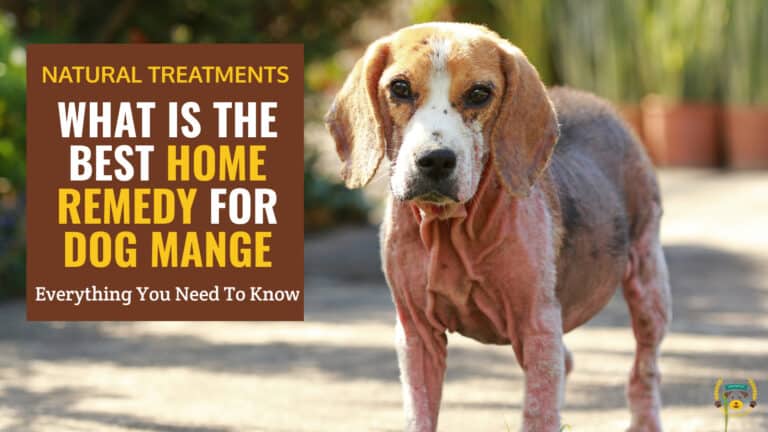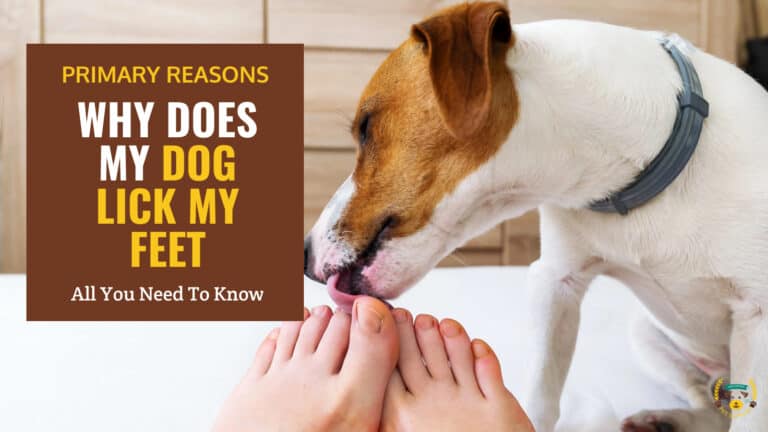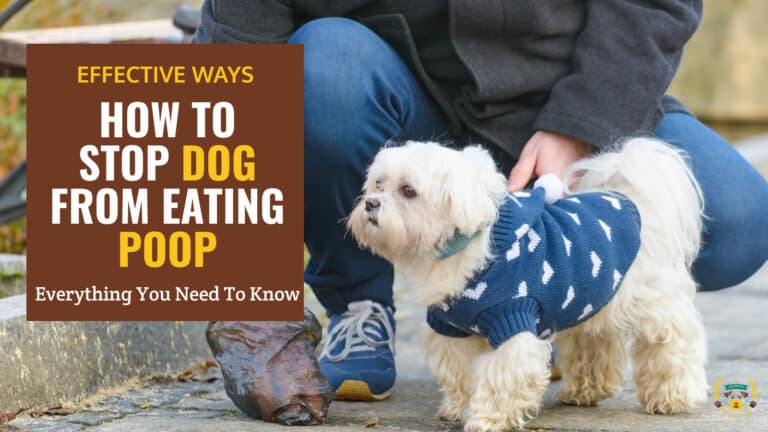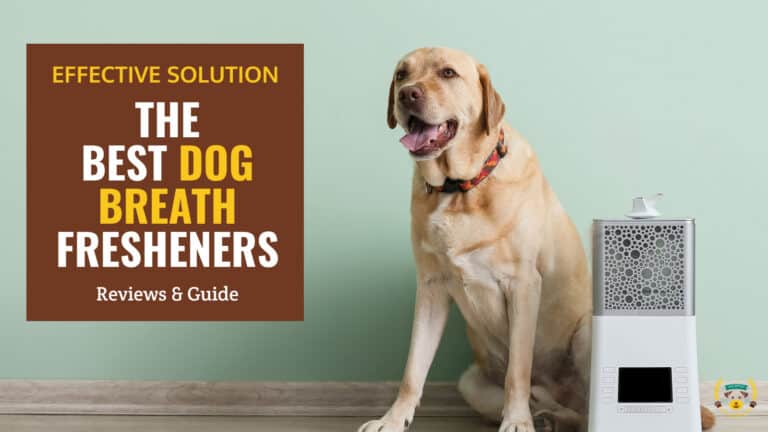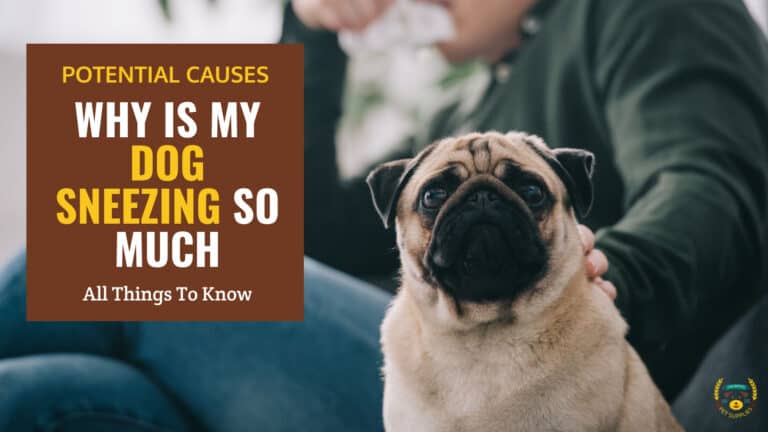Why Does My Dog Smell Like Fish? - Anal Gland Issues Preventing and Remedies
Last updated: March 7, 2024
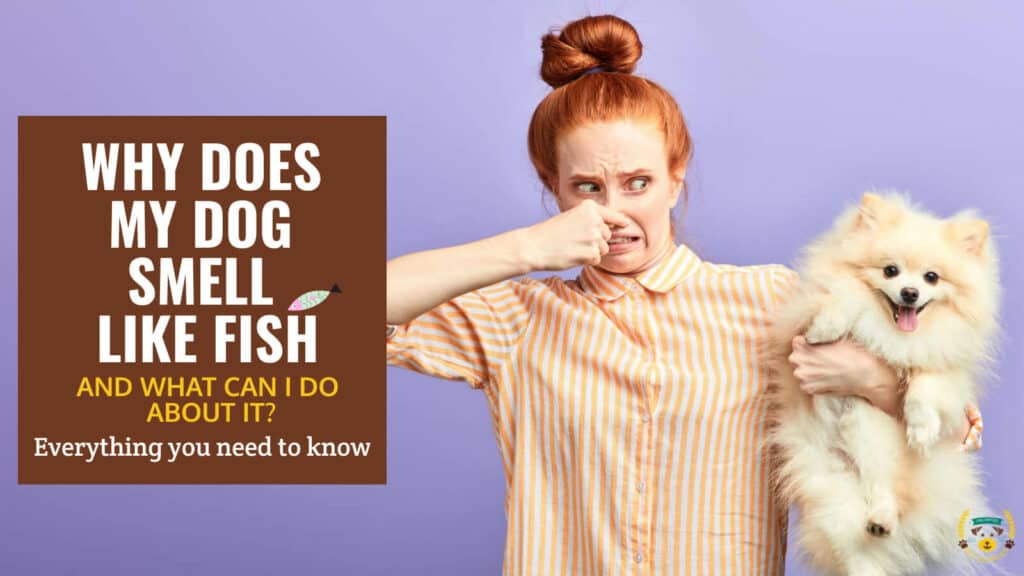
Summary
- Dogs may smell like fish for a variety of reasons, but anal gland problems are the most common.
- Anal glands are small sacs located on either side of the anus that produce a lubricating fluid.
- If the glands become blocked, the fluid can back up and cause a foul smell.
- Other causes of a fishy smell in dogs include food sensitivity, skin or ear infections, teeth problems, allergies, urinary tract infections, and kidney disease.
- If you notice a fishy smell coming from your dog, it is important to consult with a veterinarian to determine the cause and get the appropriate treatment.
If you are a dog owner, you have probably noticed that it does occasionally smell weird whenever it goes out and decides to roll down in different places, only to end up smelling like dirt, trash, grass, etc.?
This is perfectly normal, and most of the time, a good bath takes the nasty smells away. However, if you notice a pungent fishy smell that won't go away even with regular bathing and grooming, you should immediately take your dog for a vet visit. This may be an indicator of an underlying condition that makes a dog smell like fish.
There are many causes of fishy odor in dogs, but most commonly, this is related to anal gland issues. It's not a very serious or life-threatening condition and is common in dogs of different sizes and breeds. Still, the smell is usually too potent and unpleasant to tolerate, which forces dog owners to try to fix the problem as soon as possible.
In this article, we will be guiding you and providing all the necessary information that a dog owner needs to know about dog anal gland disorders and diseases.
We will also be exploring the other causes and solutions to the condition. In the end, you will be able to precisely identify what problems can cause the strong odor and what needs to be done so as to bring the freshness back to both your dog and your house.
Happy reading!
- 1) Why Does My Dog Smell Like Fish?
- 2) Dog Anal Gland Fishy Smell
- 3) What Are Anal Glands in Pets?
- 4) Anal Sac Disease: What Are the Symptoms of Anal Gland Issues in Pets?
- 5) How to Spot if Your Dog Has Blocked Anal Glands?
- 6) Causes of Anal Gland Odors
- 7) How to Treat Anal Sac Disease?
- 8) Dog Breeds Vulnerable to Anal Sac Disease
- 9) How to Prevent Anal Sac Disease?
- 10) Why Does My Dog's Breath Smell Like Fish?
- 11) Fishy Urine
- 12) When Is Fishy Odor in Dogs a Problem?
- 13) Products to Eliminate Fishy Odor in Dogs
- 14) Final Thoughts
Why Does My Dog Smell Like Fish?
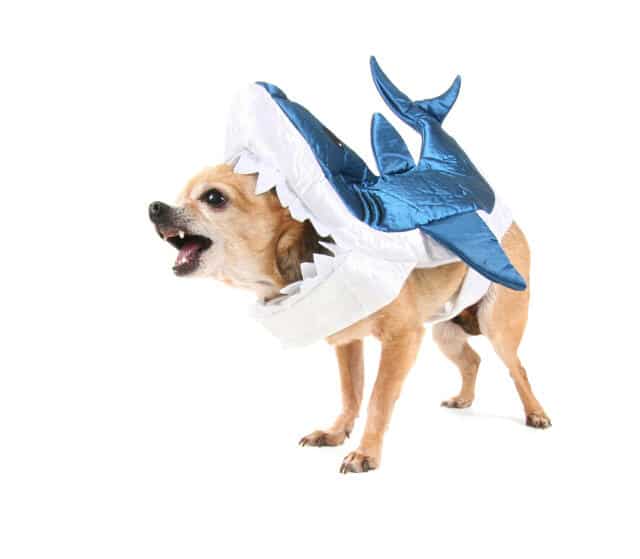
Your dog may smell like fish because of multiple reasons. Food sensitivity, skin or ear infections, teeth problems, allergies, urinary tract infections, etc. can all cause the fish smell, but the main and most common causes are directly related to anal gland problems.
Anal glands are small sacs located on either side of the dog's anus. They secrete oils into the rectum and they also help keep feces from being expelled through the anus. The oil helps prevent bacteria growth and keeps fecal matter soft enough to pass easily without any discomfort.
Anal gland blockages or infections result in the release of the contents of the glands even when the dog is not toileting. When these glands become blocked by hairballs, food particles, parasites, foreign objects, etc., then the secretion becomes trapped inside them. When this happens the resulting buildup creates a foul odor that cannot be removed by washing.
Dog Anal Gland Fishy Smell
As mentioned before, this is the number one cause of your dog's fish smell. Sometimes, the glands are simply too full and consequently start releasing the liquid inside. This means that the glands may need to be manually expressed by a veterinarian.
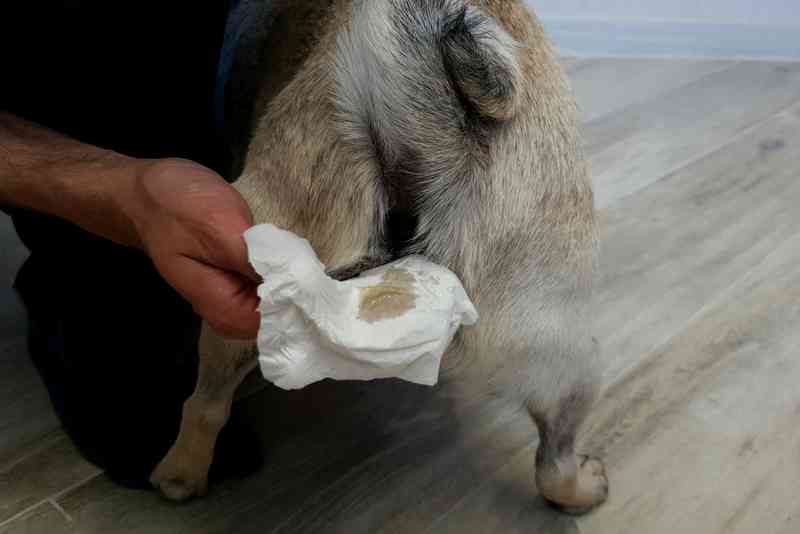
Other times, the acute smell can be caused by anal sac disease, a very common problem in dogs of different breeds. It is usually treated using antibiotics.
Other, less common causes of the problem include obesity, the insufficient fiber in the dog's diet, chronic soft stool, etc. Whatever the issue(s) causing the problem, it's advisable to contact a veterinarian to know exactly what to do to treat and prevent the symptoms.
What Are Anal Glands in Pets?
First of all, please note that what we are talking about here are just theories; the function of the glands is yet to be scientifically proven. However, the following theories are sensible and rational.
In pets, anal glands, also called anal sacs, are similar to those found in humans (even if there is still discussion on why humans still have them). These glands produce lubricating fluids that protect against irritation or infection during defecation. If there is no obstruction, the fluid flows freely through the colon and exits via the anus.
So, the primary functions of anal sacs are to protect the anal tract from bacterial growth and help make the defecation process smoother and painless. In addition to their primary functions, a lot of scientists believe that anal glands also have an essential communicative function.
Believe it or not, your dog (or cat) is still a predator; that's encoded deep in its DNA. It is believed that the fluid from the sacs contains information such as the pet's approximate age, gender, breed, etc. In other words, the fluid works as a strong territory scent marker to warn other animals, through smell, not to trespass the territory.
Anal Sac Disease: What Are the Symptoms of Anal Gland Issues in Pets?
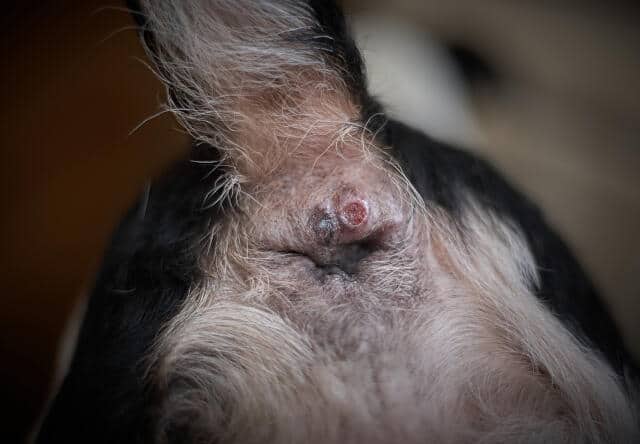
There are many indicators that would mean your pet may be having anal sac issues, with the fishy smell being the most obvious one. Some of these signs will only appear after some time has passed since the initial onset of the condition. Others will show up immediately. Here are some of the most common ones:
- Your dog starts showing unusual behavior around its rear end area. For example, it might try to excessively lick at it, rub it with its paws, scratch or bite it, etc.
- Scuffing its rear end along the lawn or floor.
- There is a bad odor coming out of the anus.
- You notice blood or pus in the urine or fecal matter.
- A lump appears under the skin near the anus.
- Your dog develops diarrhea or suffers from constipation.
- It starts chasing its tail.
- It seems uncomfortable while going for walks or sitting.
- It suddenly stops eating.
- It loses weight.
Some of these symptoms do not exclusively point to anal sac problems. So, once you notice one (or some) of the symptoms, you should consult your veterinarian to remedy the problem and any potential underlying causes as soon as possible.
Related: Common Health Problems in Older Dogs
How to Spot if Your Dog Has Blocked Anal Glands?
In general, if your dog starts showing any of the symptoms listed in the previous section, this may indicate that the anal glands are blocked. However, some of those symptoms are more common signs of the condition.
If your dog's anal glands are blocked, you will most probably notice the foul smell. You may also notice a lump forming near the anus under the skin because the glands' size gets larger with the liquid trapped inside them.
Of course, the other symptoms can also indicate a blocked anal gland condition, but they can also indicate other different problems. The most obvious signs of blocked glands include a lump forming under the skin along with a nasty fishy smell.
Causes of Anal Gland Odors
Anal glands are located in the anal canal, which is a small opening at the end of the rectum. Sometimes, things get stuck in the glands and create a build-up of secretions that eventually leads to a bad unpleasant odor.
The following conditions can lead to anal gland obstructions:
• Hairball - A large amount of hair accumulates around the anal area due to poor hygiene habits. As a result, the hairs stick together and form balls that gradually grow bigger. Once formed, the balls begin blocking the passage between the anus and the rectum.
• Parasites - Some intestinal worms such as roundworms, hookworms, whipworms, tapeworms, pinworms (Enterobius), etc., live within the intestines and attach themselves to the walls of the intestine. Their presence makes their way up to the anal region where they feed off the mucous membranes lining the glands.
• Foreign Objects - Any object lodged in the anal canal will make its way to the glands and cause an unpleasant odor. Examples include coins, toys, bones, plastic bags, rubber bands, paper clips, buttons, shoelaces, etc.
How to Treat Anal Sac Disease?
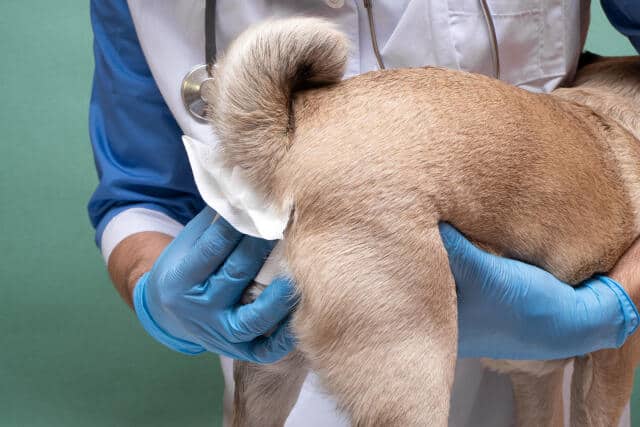
The good news is that anal sac disease can be easily treated with a visit to the veterinarian's office. The vet will clean the sacs and prescribe antibiotics and anti-inflammatory medicine.
The operation must always be performed by a qualified person. If you try to do it at home, you may cause a lot of pain to your pet or, even worse, cause serious injuries or infections to the anal tract.
First, the vet will check to see if the sacs are swollen; if they are, he/she will perform manual anal gland expressions. That is, the vet will try to gently squeeze and empty the glands. After that, the anal tract will be cleaned and medicine can be described.
If left untreated, the disease can develop into an abscess. In that case, the vet will cut the abscess open and drain it from the accumulated pus. Then a specific diet and medicine will be prescribed. Daily application of warm compresses on the dog's anal area can also help with the recovery process.
In some situations, especially during the very first stages of the disease, switching to a fiber-rich diet can also solve the problem. The higher fiber content will make the stool harder and eventually force the contents of the glands to be pushed out.
Dog Breeds Vulnerable to Anal Sac Disease
Genetics is another major factor when it comes to anal sac disease. Some breeds are more prone to developing the issue while others are not. That said, it doesn't mean that some dogs are immune to the disease, as all dogs of different breeds can have it. It just means that some breeds are less likely to have anal gland issues, provided that they have a good diet and hygiene.
Smaller breeds of dogs are more predisposed to having anal sac disease. Examples include Chihuahuas, Cocker Spaniels, Basset Hounds, Lhasa apsos, Miniature Poodles, Toy Poodles, Beagles, etc.
On the other hand, larger breeds are less likely to suffer from anal sac issues. However, the possibility of the disease-causing discomfort to large dogs should never be ruled out, as they too can develop anal gland problems, be it to a lesser degree.
As a result, it is advisable for dog owners to pay attention to their pets and their behavioral changes, their diets, and hygiene, and to regularly pay a visit to the vet's office.
How to Prevent Anal Sac Disease?
If your beloved dog is of a breed that is at higher risk of developing anal sac disorders, then you probably want to do anything it takes to avoid facing the issue in the first place; Prevention is always better than cure!
There are many things you can do to save your beloved pet and yourself from the trouble of going through that painful and annoying experience.
Sadly, we cannot guarantee that your dog will never suffer from anal sac issues, but if you follow our advice, we assure you that the chances of your puppy having the problem will be much lower.
- Make sure your dog is on a healthy diet. This will ensure that the digestive system, including the anal tract and glands, will be healthy. Remember that even in the first stages of the condition, a fiber diet can do wonders and avoid any complications.
- Your pet must have plenty of physical exercises. Obesity is one of the causes of the condition, and smaller obese dogs are more likely to suffer from it. So, try to spend as much time walking, jogging, and playing with your dog as possible.
- If your dog has issues with its anal sacs or has had the issue many times in the past, you need to make sure the vet checks them at every checkup.
- You also need to keep an eye on your dog's behavior. If it seems uncomfortable or acts differently, get it checked by the vet immediately.
- Finally, don't forget about your grooming routine and overall hygiene. Make sure that your dog gets regular baths and brushings so that there won't be any infections or build-up of dirt or hair around the anus area.
Why Does My Dog's Breath Smell Like Fish?
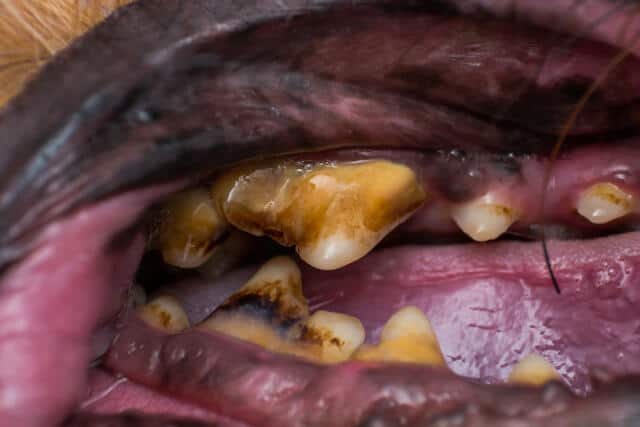
There are many causes of the dog's bad breath, but if you notice that your dog has fishy breath, this could be linked to the topic at hand: anal gland issues.
When the dog starts licking and biting its anal area, the fishy scent caused by the anal gland secretion will transfer to its mouth. This is the simplest explanation, but there are many other factors not related to the anal area that can cause fishy dog breath. Let's explore some of them!
- Upset stomach- As simple as it may seem, an upset stomach caused by any type of food allergy or sensitivity, or environmental allergies can potentially lead to fishy breath in dogs.
- Plaque and tartar- Excessive buildup of plaque and tartar is another cause of the issue.
- Oral health issues- These include teeth and gum infections and inflammations, Gingivitis, Periodontal disease, tumors, etc.
- Kidney disease- One of the primary functions of the kidneys is to filter the blood from any harmful toxins or chemicals. Kidney problems mean that the filtration process is not perfect, which can lead to many problems, including fishy breath.
- Diabetes- Diabetes Mellitus is a condition where the dog has abnormal levels of blood glucose related to insulin production and treatment dysfunctions. Diabetes can be the underlying condition behind a dog's fishy-smelling breath.
- Pieces of food caught in the mouth or teeth- Sometimes, the cause of the bad breath is much simpler: food pieces caught in the mouth or between teeth.
How Do You Prevent Periodontal and Digestive Problems in Your Dog?
It is important to work with your veterinarian so as to prevent your canine friend from suffering from any periodontal or digestive issues and thus avoid the annoying fishy breath. Here is what should be done for the best possible results:
- Schedule regular visits to the vet's office: Try your best not to miss any visits. Regular checkups will ensure your pooch will always be in good health.
- Whenever you go to the vet's office, make sure that your dog gets a thorough oral check: This will help notice any problems early and avoid any potential complications.
- Make sure you brush your dog's teeth every day: Regular dental cleaning will guarantee there are no germ and infection-causing food pieces left in the dog's mouth and teeth.
- Buy only quality dog food: These snacks and foods usually contain additives that help the dog have stronger teeth, bones, digestive system, etc. This is the best thing to do if you want your dog to always be at the peak of health. If your dog has allergies, you must bear that in mind while choosing the right food.
- Avoid giving too much sugar to your pet: Sugar is one of those things that makes our pets happy, but when given in excess amounts, they become very sick. If you see your dog eating sweets all the time, try cutting down on their intake.
- Give your dog healthy treats: Healthy snacks such as fruits, vegetables, nuts, seeds, eggs, meat, chicken, etc., are great alternatives to unhealthy ones. They also provide essential nutrients needed by the body. The treats also need to be safe; for instance, bones can be dangerous, as they can break and cause injury to the mouth, gum, or digestive system or even damage the dog's teeth.
- Chewing toys need to be safe for the dog: For the daily chewing routine, make sure the toys don't contain any sharp parts to avoid accidents.
Check Also: Homemade Dog Food vs Commercial Dog Food
Fishy Urine

If you notice that your dog's urine smells like fish, take it to the vet in order to pinpoint what the issue is exactly. Foul-smelling urine in dogs can be caused by a variety of more or less serious conditions usually related to the urinary tract.
Prostate disorders in male dogs, bladder cancers, and stones in the kidney or bladder can all cause fishy urine in your pet, but the most common cause of the condition is a urinary tract infection - U.T.I.
A urinary tract infection happens when bacteria enter the bladder through the urethra (the tube that empties the bladder of urine).
When this occurs, it causes inflammation and irritation around the area. As a result, the odor associated with U.T.I.s comes out in the form of ammonia.
Other symptoms of U.T.I. include frequent urination, pain during urination, bloody urine, fever, vomiting, diarrhea, loss of appetite, lethargic behavior, depression, excessive thirst, increased water consumption, decreased activity level, and weight loss.
The most common type of U.T.I. is caused by E. coli bacteria. Other bacteria identified as causes of U.T.I.s include Enterococcus spp., Klebsiella spp., Proteus spp., and Staphylococcus spp.
If the veterinarian suspects your dog has U.T.I., he/she tests a sample of the puppy's urine to confirm the condition; after that, antibiotics and anti-inflammatory medications are used to treat it from seven to 14 days.
Also, it is advisable for the dog to drink more clean water during treatment to help flush the bacteria out of the bladder.
When Is Fishy Odor in Dogs a Problem?
The answer to this question depends on the cause(s) of the distinct smell of fish. Dogs are curious creatures; Once they go outside, they will try to explore everything surrounding them.
Sometimes, your dog may go fiddling in some garbage or play and roll in a dirty place and end up smelling like fish. A good bath is enough to get rid of the nasty scent.
However, if you notice a bad smell that won't go away even after several baths and grooming sessions, that could be a problem. To begin with, the smell will be too potent for any humans living in the house, and the condition may develop to cause discomfort or even pain to your beloved pet.
The problem is that there is no way for you to know what is causing the fishy odor. As we have seen earlier, it could be caused by an anal gland infection, anal sac tumors, dental disease or other oral issues, allergies, digestive problems, etc.
Sometimes, the odor can be caused by some more severe underlying conditions like kidney and bladder stones or tumors, prostate issues, diabetes, UTIs, etc.
To be on the safe side, we suggest considering fishy odors in dogs a problem as soon as you notice them. You need to go to the vet as soon as possible to diagnose the problem and try to fix it.
If it is a minor problem like anal gland disease or blockage, the veterinarian will easily fix it by performing a manual expression of the anal gland fluid and prescribing any necessary medication. If a more serious medical condition is identified as the source of the scent, it will be better to treat it in the early stages.
Products to Eliminate Fishy Odor in Dogs
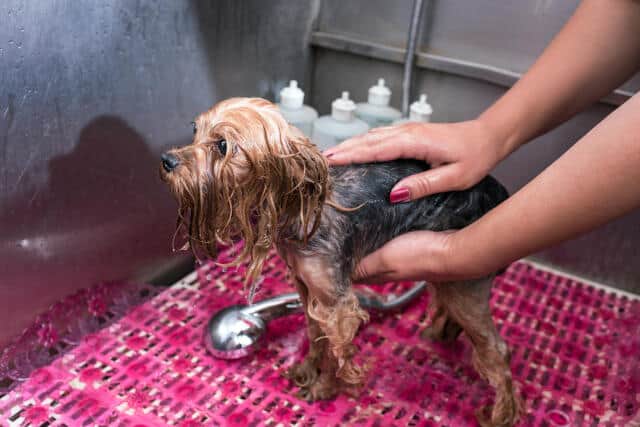
It is not easy to get rid of the fish smell; if your dog smells like fish for any reason (some discussed above), then using your regular good-smelling dog shampoo will not eliminate it. Luckily, there are some things you can try to make your puppy smell better.
The first obvious choice of a dog owner is to try to find dog products that could be better at neutralizing the nasty fish odor. Deodorizing dog shampoo can be a solution, but there are other chemical products that can be used here, such as Hydrogen Peroxide or the XO Odor Neutralizer. These will do a better job eliminating the smell than regular shampoo.
Some household products can also help here; these include baking soda (to be applied to the fur), apple cider vinegar, lemon juice, white vinegar, dish detergent, etc. Of course, you must always pay attention to the dog's eyes and mouth if you decide to use such products.
You may also opt for a homemade spray mix to bring the freshness back to the dog and the house. You can use six or more drops of lavender essential oil mixed with some Hazel witch (1/4 of the bottle) and water (3/4), and voila! The mix is ready. You may use more drops of lavender oil, but not too much, as your dog won't like it if the mix is too strong.
Final Thoughts
The fishy odor, in addition to any behavioral changes in the dog, can be a frightening experience to any dog owner. Seeing your puppy unable to toilet normally, lose appetite, have trouble walking or sitting, etc., will surely raise any concerns about what may be causing the problem. You just want your dog to be healthy again!
The underlying causes of fishy smell in dogs are numerous, sometimes with overlapping symptoms, which makes it almost impossible for the owner to pinpoint what is exactly wrong with their dog. The best thing to do is to pay a visit to the vet's office to diagnose and try to fix the problem.
In this article, we tried to cover the topic in detail. We discussed the potential causes and remedies to the issue at hand. We also provided tips and advice on how to prevent your dog from going through that painful experience.
If you follow our guidelines, we guarantee that the risk of the fish smell condition affecting your dog will be much smaller. It's all about having the right eating and hygiene habits!
If you still have any queries or comments, please feel free to contact us or leave a comment below. We will be more than happy to assist you the best we can!

